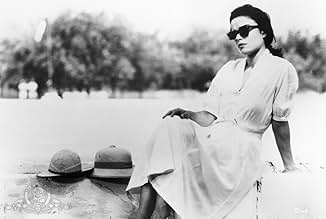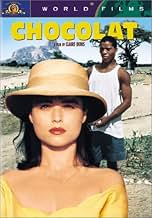Füge eine Handlung in deiner Sprache hinzuA French woman returns to her childhood home in Cameroon - formerly a colonial outpost - where she's flooded by memories, particularly of Protée, her servant.A French woman returns to her childhood home in Cameroon - formerly a colonial outpost - where she's flooded by memories, particularly of Protée, her servant.A French woman returns to her childhood home in Cameroon - formerly a colonial outpost - where she's flooded by memories, particularly of Protée, her servant.
- Regie
- Drehbuch
- Hauptbesetzung
- Auszeichnungen
- 1 Gewinn & 3 Nominierungen insgesamt
Empfohlene Bewertungen
I was struck with the dignity of Potee, with his struggle to maintain his dignity among his peers and with his white bosses. I was also struck with the love/hate relationship between him and Aimee. It is the latter that gives the film its driving force, it is the latter that links this movie to Indochine.
One never is sure what motivates everyone, though some of the characters are required of a remembrance of colonialism. It is this cynical side of the story that ties it to Coup de Torchon. Theirs is the more scandalous story, perhaps even more interesting in a depraved way, but Denis gives us a remembrance of how it was with all the tension and unresolved relationships.
The American black who gives the grown up France a ride in the beginning and end of the movie offers yet another interesting side to the confusion that we in the Western world have when we look at Africa. He says that when he came he wanted to call everyone brother. He was coming home, but they just thought him to be a little daft. France, the character and the girl, grew up in Cameroon, but neither fully understands what it is even though they can remember how it was.
I always mentioned that I felt this film had one of the "sexiest" scenes I had ever seen in a movie. One year, a 17-year-old African-American shouted, "Yes!" when he figured out the scene: the one where Protée is helping Aimée lace up her evening dress, all the while both are examining the reflection of the other in the mirror. Directors use the "mirror technique" when then want to focus on the inner conflict on the part of one or more character in a scene: this is a perfect example of the technique, and it is "sexy".
Most students had trouble understanding the end of the film. One suggested that one theme of the movie was "Africanism", and that no matter how much one loved Africa or Africans, one cannot "become" African (like the driver tried to do): one must BE African.
Wusstest du schon
- WissenswertesIn a 1989 interview with Judy Stone, Claire Denis explained that the title, comes from the 1950s slang meaning "to be had, to be cheated", and thus refers to the status in French Cameroon of being black and being cheated; it is also an allusion to Protée's dark-brown skin and the racial fetishism of Africans by Europeans.
- Zitate
Marc Dalens: When you look at the hills, beyond the houses and beyond the trees, where the earth touches the sky, that's the horizon. Tomorrow, in the daytime, I'll show you something. The closer you get to that line, the farther it moves. If you walk towards it, it moves away. It flees from you. I must also explain this to you. You see the line. You see it, but it doesn't exist.
Top-Auswahl
- How long is Chocolat?Powered by Alexa
Details
- Erscheinungsdatum
- Herkunftsländer
- Sprachen
- Auch bekannt als
- Chocolat
- Drehorte
- Mindif, Kamerun(Town where the film is set)
- Produktionsfirmen
- Weitere beteiligte Unternehmen bei IMDbPro anzeigen
Box Office
- Budget
- 1.300.000 FRF (geschätzt)
- Bruttoertrag in den USA und Kanada
- 2.344.286 $
- Eröffnungswochenende in den USA und in Kanada
- 2.710 $
- 20. Sept. 2015
- Weltweiter Bruttoertrag
- 2.344.286 $
Zu dieser Seite beitragen




























